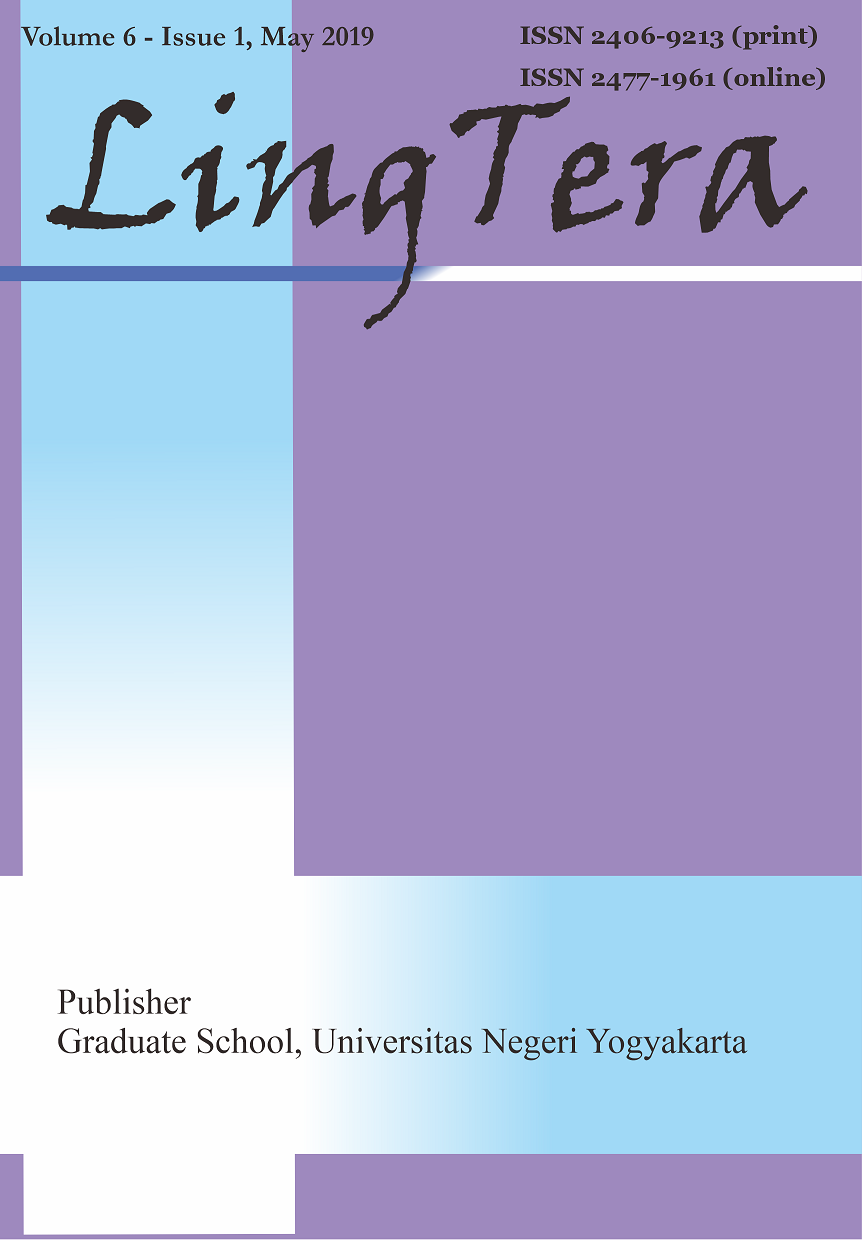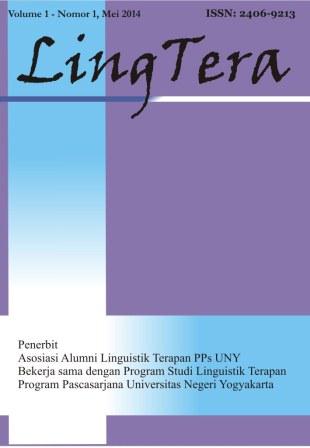E-portfolios and e-dialogue journals: Exploring their use in teaching writing skills
DOI:
https://doi.org/10.21831/lt.v6i1.10300Keywords:
e-portfolios, e-dialogue journals, writing skillsAbstract
This research was aimed to find out (1) whether the use of e-portfolios is more effective than the use of e-dialogue journals, (2) whether the use of e-portfolios is more effective than the use of conventional assessments, (3) whether the use of e-dialogue journals is more effective than the use of conventional assessments, and (4) the most effective assessment of all in the teaching of writing skills. This study was a quasi-experimental research using Pretest-Post-test Control Group Design. The data were collected in January-February 2016 in SMK Penerbangan Adisucipto Ardhya Garini. The sample of the research was the students of class X3, X4, and X8 which were determined by using cluster simple random sampling. There were four hypotheses of this study and the research findings revealed that the hypotheses were accepted. It was indicated by all of the Sig values which were lower than the level of significance (0.05).
References
Alawdat, M. (2013). Using e-portfolios and ESL learners. Online Submission, 3(5), 339–351.
Azwar, S. (2003). Penyusunan skala psikologi. Yogyakarta: Pustaka Pelajar.
Badan Standar Nasional Pendidikan. (2006). Standar isi dan standar kompetensi lulusan untuk satuan pendidikan dasar SD/MI. Jakarta: BP. Cipta Jaya.
Barrett, H. (2006). Using electronic portfolios for formative/classroom-based assessment. Classroom Connect Connected Newsletter, 13(2), 4–6. Retrieved from https://electronicportfolios.org/portfolios/ConnectedNewsletter.pdf
Brown, H. D., & Abeywickrama, P. (2004). Language assessment. In Principles and Classroom Practices. White Plains, NY: Pearson Education Inc.
Chau, J., & Cheng, G. (2010). Towards understanding the potential of e-portfolios for independent learning: A qualitative study. Australasian Journal of Educational Technology, 26(7). https://doi.org/10.14742/ajet.1026
Gerbic, P., Lewis, L., & Amin, N. M. (2011). Student perspectives of e-portfolios: Change over four semesters. In Changing Demands, Changing Directions. Proceedings ascilite Hobart 2011 (pp. 423–436). Tasmania: Proceedings ASCLITE Hobart. Retrieved from http://www.ascilite.org/conferences/hobart11/downloads/papers/Gerbic-full.pdf
Harmer, J. (2007). How to teach English. ELT Journal, 62(3), 313–316. https://doi.org/10.1093/elt/ccn029
Johnsen, H. (2012). Making learning visible with eportfolios: Coupling the right pedagogy with the right technology. International Journal of ePortfolio, 2(2), 139–148. Retrieved from http://www.theijep.com/pdf/IJEP84.pdf
Knapp, P., & Watkins, M. (2005). Genre, text, grammar: Technologies for teaching and assessing writing. Education. UNSW Press.
Meyer, E., Wade, A., & Abrami, P. C. (2013). Teaching with electronic portfolios to develop 21st Century literacies. LEARNing Landscapes, 6(2), 265–282.
Mustafa, D. A. I., & Efendi, A. (2016). Pengembangan bahan ajar pembelajaran menulis cerita berbasis pendekatan proses bagi siswa SMP. LingTera, 3(1), 1. https://doi.org/10.21831/lt.v3i1.8469
Naba'h, A. A. (2013). The effect of using electronic dialogue journals on English writing performance of Jordanian students. Int. Arab J. E-Technol., 3(1), 37–43.
Obisuru, M., & Purbani, W. (2016). Kemampuan menulis bahasa Inggris siswa melalui self-editing and self-correcting berdasarkan analisis kesalahan gramatikal dan kosakata. LingTera, 3(1), 51. https://doi.org/10.21831/lt.v3i1.8473
Richards, J. C., & Renandya, W. A. (2002). Methodology in language teaching: An anthology of current practice. Cambridge University Press.
Stefani, L., Mason, R., & Pegler, C. (2007). The educational potential of e-portfolios: Supporting personal development and reflective learning. Routledge.
Widianto, E. (2016). Menteri Anies: Lulusan SMK harus berstandar internasional. Retrieved from https://m.tempo.co/read/news/2016/05/23/058773376/menteri-anies-lulusan-smk-harus-berstandar-internasional
Downloads
Published
How to Cite
Issue
Section
Citation Check
License
LingTera allows readers to read, download, copy, distribute, print, search, or link to its articles' full texts and allows readers to use them for any other lawful purpose. The journal allows the author(s) to hold the copyright without restrictions. Finally, the journal allows the author(s) to retain publishing rights without restrictions.
- Authors are allowed to archive their submitted articles in an open-access repository.
- Authors are allowed to archive the final published article in an open-access repository with an acknowledgment of its initial publication in this journal.

Psychology, Evaluation, and Technology in Educational Research is licensed under a Creative Commons Attribution-ShareAlike 4.0 International License.
Based on a work at https://petier.org/index.php/PETIER.










